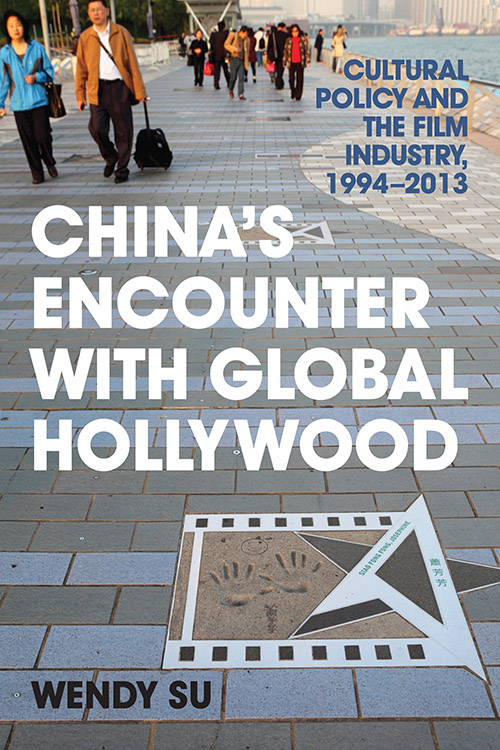- Read an interview with the author of a book due May 13 from University Press of Kentucky
- In a love-hate relationship with Hollywood, China’s government is a ‘bigger winner’
- The author argues that Hollywood’s best partners are ‘large state-owned film groups’
There’s a delicate dance going on between Beijing and Hollywood. As a rising global power, China wants to build up its own domestic film industry with the help of the pop culture juggernaut of Hollywood, but not at the risk to its own stability. The history of the relationship shows the two sides at times competing, collaborating, and even compromising. Who will win in the end is anybody’s guess, but by looking at the history of China’s engagement with Hollywood, author Wendy Su provides some clues as to what lies ahead.

Su’s upcoming book China’s Encounter with Global Hollywood: Cultural Policy and the Film Industry, 1994-2013 takes a forensic look at how the Chinese government, filmmakers, and moviegoers have grappled with their love-hate relationship with Hollywood. According to Su, in this complicated game of give-and-take, so far, the Chinese government has been the bigger winner.
What attracted you to this subject matter?
My research falls along the intersections of global communication, Chinese media studies, and cultural studies. I am particularly interested in examining how global diffusion of American culture influences China, as some scholars have contended that globalization is merely a euphemism for Americanization. This interest stems from the experience of our generation of college students who had been heavily influenced by American culture, and TV programs and films in particular. I still recall my family’s routine of watching American films on TV every Wednesday evening during the reform and open-door era of the 1980s, when Western ideas flooded into China. These films unfolded before us an entirely different world, and inspired us to seek an ideal human life. With the large-scale arrival of global capital in China since the 1990s, American pop culture has infiltrated into this vast land and exerted an unprecedented influence on the Chinese people. Needless to say, the U.S.-China relationship and the influence of American culture are important forces that have contributed to China’s profound social change, and will continue shaping China’s course of modernization. Previous studies often highlight Hollywood’s domination and triumph; my book argues for local agency and the capability for negotiation and for reversing the power relationship.
How did your previous work as a journalist in China and Hong Kong help or hinder this book?
I worked as a journalist in mainland China and Hong Kong between 1990 and 2000, a period in which both China and its film industry were undergoing a drastic change toward marketization and globalization. I personally witnessed this transition, and acquired much first-hand information, which was very helpful in laying out the overall context of the book. I also worked in Hong Kong for three years up to the handover [in 1997], and personally experienced Hong Kong people’s complicated feelings and their struggle, which helped me to obtain a critical perspective and a deeper understanding of social circumstances surrounding local society, culture, and identity.
Does your book explain why Beijing fears opening the door too wide to Hollywood expertise?
In academia, we call this dynamic “the global-local interplay,” through which both sides can gain something. Hollywood is often depicted as an unstoppable global juggernaut, leaving shattered fragments of domestic film industries in its wake as it searches for markets outside of the United States. The Chinese government’s strategy is “to borrow a boat to go to sea”—taking advantage of Hollywood resources to achieve its own goal of reforming the domestic industry, promoting Chinese culture and image through movies while stilling maintaining the so-called “socialist core value system.” My book explains how the Chinese government has adapted to and integrated global capital and Hollywood’s model into the management of domestic film production and distribution systems. The book provides a thorough and balanced analysis of how Hollywood’s entry into China triggered negotiation, adaptation, and reinforcement of state power.
How can Chinese filmmakers navigate the straits between censorship and getting to market?
Chapter four of my book provides a detailed analysis of the martial arts genre as a survival strategy adopted by mainland Chinese and Hong Kong filmmakers under the dual pressures of film marketization and state censorship. I argue that new Chinese martial arts cinema represents both escapism from and conformity to the established social order, and therefore, becomes the government’s soft power.
Has Beijing succeeded in consolidating power and opening the door to foreign film interests?
I believe the government’s plan has been well-played, and the government has been at least partially, if not completely, successful in transforming China’s film sector from a Soviet-style planned-production-and-state- ownership model to a market-oriented cultural industry, consolidating its power while opening the door to foreign interests.
Are there clear camps of Chinese with different opinions about the direction of the film industry?
Yes, there were clear camps: the left wing, the liberals, and ordinary moviegoers. Each camp has its own opinions as to the direction of China’s film industry. Chapter two of my book explores this issue. In the end, the government pressed on its plan, and a consensus seems to have been reached: that is, selectively opening up the space to foreign and private interests, while incorporating all film production in the rubric of the state.
What have the Hollywood studios gotten right and wrong upon entering China?
I don’t have an overview of the record, only a few examples. One example is Warner Bros. International Cinemas (WBIC), which withdrew from China in November 2006 due to China’s policy change in foreign share. It was stated that Warner Bros’ exit from China “shows the vulnerability of foreign media and entertainment companies to the country’s policy changes.” But WBIC came back to China in 2011, and announced a giant investment plan. In my own opinion, if Hollywood studios can find right partners of China, preferably large state-owned film groups, their businesses are likely to move forward smoothly.
What does the future hold, policy-wise, and in the China-Hollywood battle, can both sides win?
Currently China and Hollywood maintain a good working relationship, as seen in the growing number of coproductions. I foresee this working relationship will continue, and I don’t see any sign of drastic policy shifts. I call the China-Hollywood relation a “tug-of-war.” Other scholars have coined the term “copetition”—cooperation through competition. A win-win claim can be made by both sides if both sides have gained something throughout these years. My personal argument is that the Chinese government is a bigger winner than Hollywood up to 2013 due to its strong role and strict policy. It is still too early to declare an ultimate winner.
Where can readers buy your book?
The book is scheduled to be published on May 13th, 2016.






